- +39 0544 84380
- Questo indirizzo email è protetto dagli spambots. È necessario abilitare JavaScript per vederlo.
Fonderia Taroni: Striving for Automotive Excellence in 2024!
We have a new ambitious goal: to achieve IATF 16949 certification to deliver uncompromising automotive quality.
IATF 16949 is our roadmap to excellence, ensuring continuous improvements and a flawless supply chain.
Join us on this journey to excellence! Follow us for exclusive updates and sneak peeks into our 2024 roadmap.
Thank you for being part of our mission for excellence!
Il programma d’investimento per il quale è stato richiesto ed ottenuto il sostegno finanziario tramite il contributo del PON Imprese e Competitività 2014-2020/React EU ASSE VI – Priorità di investimento 13i – Azione RA3,1, rappresenta un elemento fondamentale nell’ambito del piano strategico di sviluppo del Gruppo.
Gli investimenti realizzati tramite il sostegno finanziario del PON durante il biennio 2022/2023 hanno l’obiettivo:
- di permettere un significativo incremento della capacità produttiva;
- di perseguire un modello di integrazione verticale produttiva attraverso la creazione di un nuovo reparto dedito alle lavorazioni meccaniche;
- di permettere un incremento della marginalità ottenuto tramite:
o un minor costo delle lavorazioni meccaniche, ad oggi esternalizzate;
o un minor costo delle attività logistiche riferite alla movimentazione del materiale.
In generale tutti gli investimenti realizzati hanno un duplice obbiettivo, da una parte quello di accrescere la competitività sui mercati dove attualmente la società del Gruppo opera e, dall’altra, di poter approcciare nuovi settori che possano garantire, per il futuro, sbocchi in nuove fasce di impiego e di utilizzo.”
ASSE VI – Priorità di investimento 13i – Azione RA3,1
“Finanziato nell’ambito della risposta dell’Unione alla pandemia di COVID-19”
The Largest Gravity Die-Casting Machine in Europe
Fonderia Taroni continues to innovate and invest in its growth, and today we are proud to announce our latest milestone: the acquisition of the largest gravity die-casting machine in Europe!
With a spacious working area of 2500 x 2500 x 2000 mm, this state-of-the-art die-casting machine represents a significant step forward in our production capacity. It allows us to create even larger and more complex aluminum gigacastings, opening the door to new opportunities and challenges in the industry.
This investment demonstrates our commitment to technological innovation and delivering high-quality products to our customers. Please continue to follow us for further updates on our growth and the new capabilities we are developing.
Thank you for being a part of our successful journey.
???? Fonderia Taroni is excited to announce its participation in the next edition of Elmia Subcontractor 2023, where you will find us at stand C01:39.
✅ Mark your calendars for November 14-16, 2023, as this event presents a remarkable opportunity to engage with key influencers in the realms of knowledge, innovation, and the future of manufacturing.
Secure your spot now by booking a meeting with us in advance.
???? Questo indirizzo email è protetto dagli spambots. È necessario abilitare JavaScript per vederlo.
???? Elmia Subcontractor is the industry's heartbeat, infusing it with vitality, enthusiasm, and momentum over three productive days. It serves as a convergence point for thousands of like-minded individuals, fostering knowledge exchange, innovation, and direct business interactions right on the exhibition floor.
This event is the ideal platform to explore the latest trends and advancements in the manufacturing industry. We cordially invite you to connect with us in person during the trade fair!
Remember to mark your calendar and plan to visit us at Stand C01:39.
Secure your spot now by booking a meeting with us in advance.
???? Questo indirizzo email è protetto dagli spambots. È necessario abilitare JavaScript per vederlo.
We look forward to welcoming you at Elmia Subcontractor 2023!
✈️Join Us at Aerospace & Defense Meeting 2023 in Torino!????
The event will take place 28-30 November 2023
⭐A&DM is the only international business convention for the aerospace and defence industry in Italy, focusing on a pre-planned programme of meetings.
⭐The programme includes side events, workshops, sessions on procurement and subcontracting policy, seminars on innovation and high-level conferences on topics relevant to the aerospace sector.
⭐Across three days, participating companies have the chance to meet, build targeted business relations and develop new projects with partners from all over the world.
❗We would be delighted to meet you in person
during the trade fair!
PLAN TO MEET US
Questo indirizzo email è protetto dagli spambots. È necessario abilitare JavaScript per vederlo.
Aluminum, a lightweight and durable material, stands out as a sustainable choice due to its infinite recyclability. As we strive for a more energy-efficient future, aluminum continues to be highly valuable offering innovative solutions and competitive advantages for businesses and consumers.
Aluminum is often referred to as the "green metal" due to its reduced environmental impact and sustainable properties. This versatile material plays a crucial role in creating eco-friendly solutions.
Known for its infinite recyclability, aluminum is highly recyclable and can be reused without losing its inherent value. Approximately 75% of all aluminum ever produced is still in use today, demonstrating its remarkable recycling capabilities.
Furthermore, aluminum offers numerous environmental and energy benefits. Its exceptional strength-to-weight ratio makes it ideal for lightweight and sturdy structures. Compared to steel, aluminum can weigh up to 65% less, resulting in significant resource and energy savings during transportation and installation.
Another key feature of aluminum is its ability to reduce greenhouse gas emissions. The aluminum industry has made significant progress in reducing carbon intensity, with a 49% decrease in primary aluminum carbon intensity since 1991. Moreover, the U.S. industry has reduced greenhouse gas emissions by 59% since 2005 and energy consumption by 55% since 1998.
Aluminum plays a vital role in promoting a circular economy. Its recyclability and durability enable materials to stay in circulation for extended periods, reducing the need for new resource extraction. This contributes to waste reduction and more efficient use of natural resources.
Aluminum finds diverse applications in industries such as automotive, construction, packaging, appliances, and more. For instance, aluminum beverage cans contain three to twelve times more recycled content compared to other competing packaging types. Additionally, vehicles incorporating aluminum components can achieve up to a 20% reduction in energy consumption throughout their life cycle.
The aluminum industry continues to innovate and develop solutions to improve energy efficiency, reduce emissions, and contribute to a more sustainable future. With its ecological characteristics and versatile applications, aluminum remains a preferred material for those seeking sustainable approaches in product design and manufacturing.
In conclusion, aluminum stands as the "green metal" thanks to its infinite recyclability, energy savings, and overall reduced environmental impact. Its versatility and sustainability make it a key choice for businesses and consumers embracing eco-friendly solutions. By utilizing aluminum, we can build a more sustainable future, promoting energy efficiency, reducing greenhouse gas emissions, and preserving natural resources. The aluminum industry continues to play a crucial role in advancing a circular economy and creating a greener and more sustainable world for future generations.
Fonderia Taroni has been utilizing aluminum for gravity casting for over 40 years, specializing in the production of medical devices, automotive and warehouse robotics, and instrument transformers. Fonderia Taroni aims to be a "green foundry" by continuously striving to make its manufacturing processes more sustainable. This includes the implementation of photovoltaic systems to generate electricity for furnaces and robots, monitoring CO2 emissions, reducing natural gas usage, and working towards ISO 50001 and Carbon Footprint certifications.
Through our efforts and future goals, we aim to achieve significant results:
✔️ 53% of our electricity comes from renewable energy sources.
✔️ 90% of our waste is recovered through recycling activities.
✔️ A 10% reduction in CO2 emissions compared to 2015.
Thank you for your continued support. We will continue to provide innovative and sustainable solutions for your aluminum casting needs.
Why use aluminium alloy EN43300 instead of EN42100 in the permanent mold casting process
The aluminum alloy EN 42100 (equivalent to ASTM 356.2) and the EN 43300 alloy (equivalent to ASTM B179-82) are both used in the gravity casting process of aluminum, but they have significant differences.
In particular, the EN 43300 alloy is characterized by greater thermal stability compared to the EN 42100 alloy. This property makes it particularly suitable for use in the energy transformer sector, where high temperatures can negatively affect material performance.
Additionally, the EN 43300 alloy exhibits good corrosion and high temperature resistance, as well as greater hardness and mechanical strength compared to the EN 42100 alloy. This makes it suitable for the production of aluminum parts subject to high mechanical stress, such as engine or industrial machine parts.
Finally, the EN 43300 alloy also has better workability compared to the EN 42100 alloy, resulting in easier production of complex and high-quality parts.
Although both alloys are used in the aluminum gravity casting process, the EN 43300 alloy offers several advantages over the EN 42100 alloy, particularly in terms of thermal stability, mechanical strength, and workability, making it an ideal choice for energy transformers and other industrial applications.
The EN 43300 aluminum alloy (corresponding to ASTM B179-82 gravity casting standard) is a corrosion-resistant aluminum alloy, composed primarily of aluminum, copper, and magnesium. This alloy is mainly used in the instrument transformer industry, where ensuring maximum reliability and safety of the electrical system is essential.
Instrument transformers are devices that allow the transformation of electrical energy from one voltage to another, enabling the distribution of electrical energy over long distances. Thanks to its unique mechanical properties, the EN 43300 alloy is an ideal choice for the production of aluminum parts for instrument transformers.
EN 43300 alloy castings undergo aging heat treatment to give the alloy a unique combination of mechanical properties, such as high tensile, fatigue, and wear resistance.
Aluminum parts produced with EN 43300 alloy are ideal for use in instrument transformers due to their corrosion and mechanical stress resistance. For example, the EN AC 43300 alloy is used for the production of parts such as coils, cores, and brackets for instrument transformers.
The use of the EN 43300 aluminum alloy in instrument transformers ensures maximum reliability and safety of the electrical system. The corrosion resistance of the aluminum parts reduces maintenance and replacement costs for the transformer, improving the efficiency of the electrical system.
Furthermore, the use of EN 43300 alloy in the production of parts for instrument transformers offers economic advantages, thanks to the ease of processing the alloy, which reduces production time and costs.
The EN 43300 aluminum alloy is a great choice for the production of aluminum parts for instrument transformers due to its high strength, corrosion and mechanical stress resistance, ease of processing, and lightweight. Its ability to ensure maximum reliability and safety of the electrical system and reduce maintenance and replacement costs makes it an economical and sustainable choice for companies operating in the instrument transformer industry.
The EN 46400 aluminum alloy is a high-strength aluminum alloy composed mainly of aluminum, copper, and magnesium. Thanks to its unique properties, this alloy is ideal for producing aluminum parts for trucks. Its high strength, good resistance to corrosion and high temperatures, ease of processing, and lightweight make it a popular choice among heavy vehicle manufacturers.
Heat treatment gives the alloy a unique combination of mechanical properties, such as high tensile, fatigue, and wear resistance.
Aluminum parts produced with the EN 46400 alloy are ideal for use in trucks due to their lightweight and ability to withstand mechanical stress during the transport of heavy goods. For example, the EN 46400 alloy is commonly used for producing engine and transmission parts, structural parts, shock absorber components, steering parts, and many other mechanical parts.
The EN 46400 aluminum alloy has been developed for use in industrial applications that require high strength and corrosion resistance, such as the automotive, aerospace, and naval industries. Its corrosion resistance is particularly useful in the production of aluminum parts for trucks, as these vehicles are often exposed to harsh weather conditions and corrosive chemicals.
The use of the EN 46400 alloy in the production of aluminum parts for trucks also has economic benefits. Thanks to the lightweight of the aluminum parts, the total weight of the vehicle is reduced, improving fuel efficiency and reducing CO2 emissions. Additionally, the ease of processing the alloy reduces production time and costs.
In summary, the EN 46400 aluminum alloy is a popular choice for producing aluminum parts for trucks thanks to its high strength, resistance to corrosion and high temperatures, ease of processing, and lightweight. Its ability to reduce the weight of the vehicle, improve fuel efficiency, and reduce CO2 emissions makes it an economical and sustainable choice for heavy vehicle manufacturers.
Rapid metal protocasting is a process start with a 3D design of your new product and manufacturing it in the desired aluminum alloy using a sand mould in which the same alloy as the final product is cast.
You can also do mechanical tooling on the prototype as well as leak testing and other pre-processing, verifying the quality of the project.
- Reduce time to market: With 3D metal prototyping, the go-to-market time reduces drastically thus enabling companies to launch new products faster in the market. Shorter time to market means having a better ability to predict success.
- Increased speed: One of the greatest advantages of metal rapid prototyping is the speed because it reduces the production time from years and months to weeks and days.
- Reducing Product Development Costs: Rapid prototyping lets you turn your concept into a test subject quickly and efficiently.
- Design freedom: Creation of complex designs, unlike traditional manufacturing methods which have its own design limitations.
- Eliminating the Risk of Product Failure: Metal rapid protocasting allows designers to discover and remedy any critical design flaws during the testing phase, before the product hits the market. This eliminates the risk of product failure and ensures the final product is of the highest quality.
- Improving User (and Stakeholder) Involvement: Prototypes created through metal rapid protocasting encourage collaboration and constructive feedback from vital sources, such as users and stakeholders. This helps to improve the overall design and functionality of the final product.
In conclusion, metal rapid protocasting is a highly efficient and versatile process that offers several benefits to companies looking to develop new products.
With its fast implementation time, design freedom, and ability to eliminate the risk of product failure, it's a popular choice for many businesses in the manufacturing industry.
By choosing Taroni Foundry, clients can be assured of receiving top-quality products made with top-choice materials and with unparalleled precision.Fonderia Taroni will partecipate as exhibitor at Radiological Society of North America - Scientific Assembly and Annual Meeting
Well be Exhibiting at RSNA 2022 and We Want to See You There!
Be sure to visit us at RSNA 2022, November 27 to December 1, in Chicago at McCormick Place, where we'll have our expert staff on hand to answer questions, provide in-person demonstrations and discuss new opportunities.
Visit us at North Hall - Level 3 - Booth 7801
For more information visit https://www.rsna.org/
18 OCTOBER 2022 - 18,00 (CET)
LIVE STREAMING EVENT
Fonderia Taroni is one of the promoters of "IN-WEST".
Event in which companies in the Ravenna (Italy) area can explore opportunities for collaboration with the state of INDIANA (USA), with particular with a focus on the three most important clusters in the state (Energy, Automotive, Healthcare)
If you are interested you can follow the live streameng of the various speeches on our YouTube channel
Mappa del Sito
Contatti
Fonderia Taroni
Sede Operativa
Via Roma, 107
48011 Alfonsine - RA
T +39 0544 84380
Email: sales@fonderiataroni.com
La ditta risulta beneficiaria di erogazioni pubbliche annotate nel Registro nazionale degli aiuti di Stato, in ottemperanza agli obblighi previsti dal DL 34/2019
Certifications









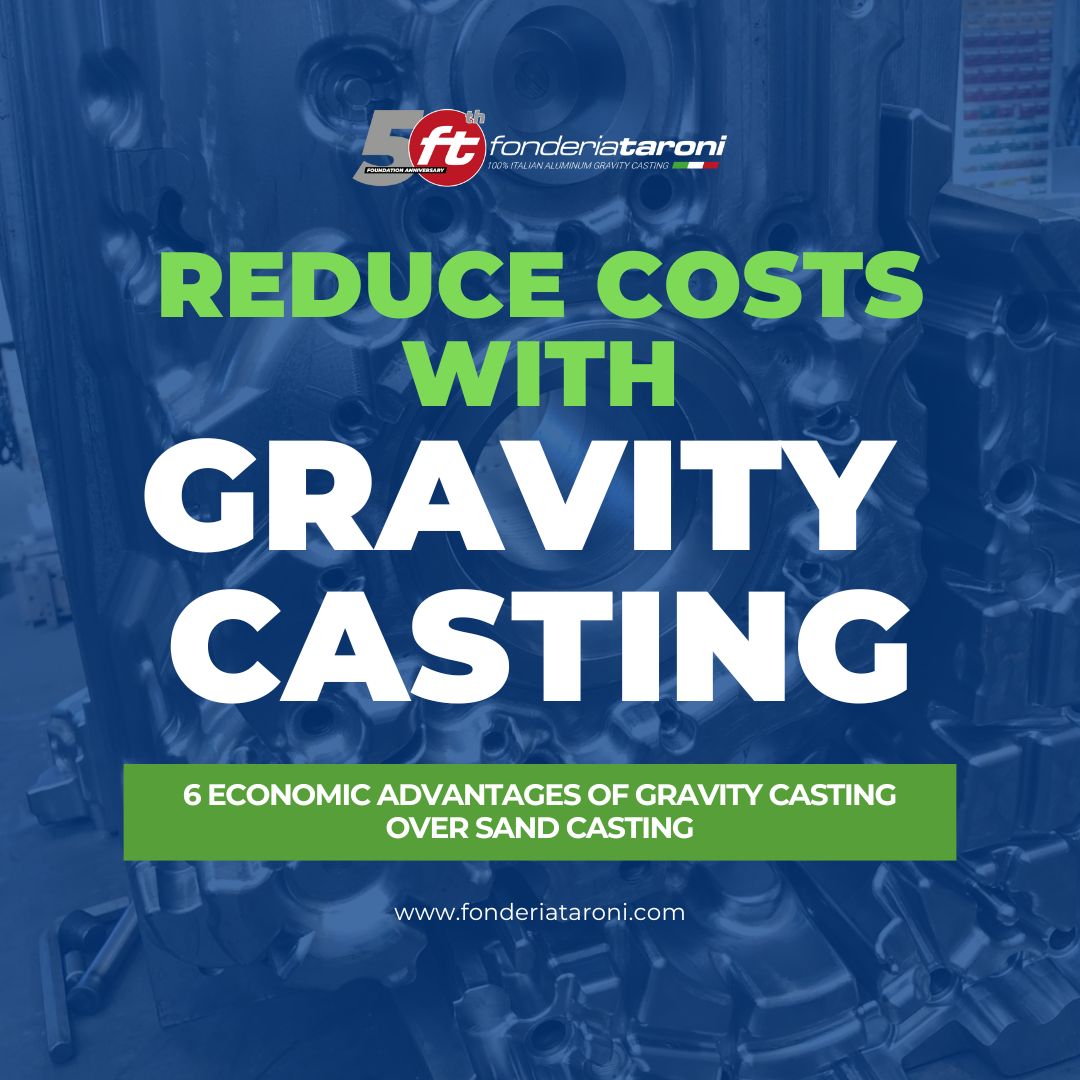
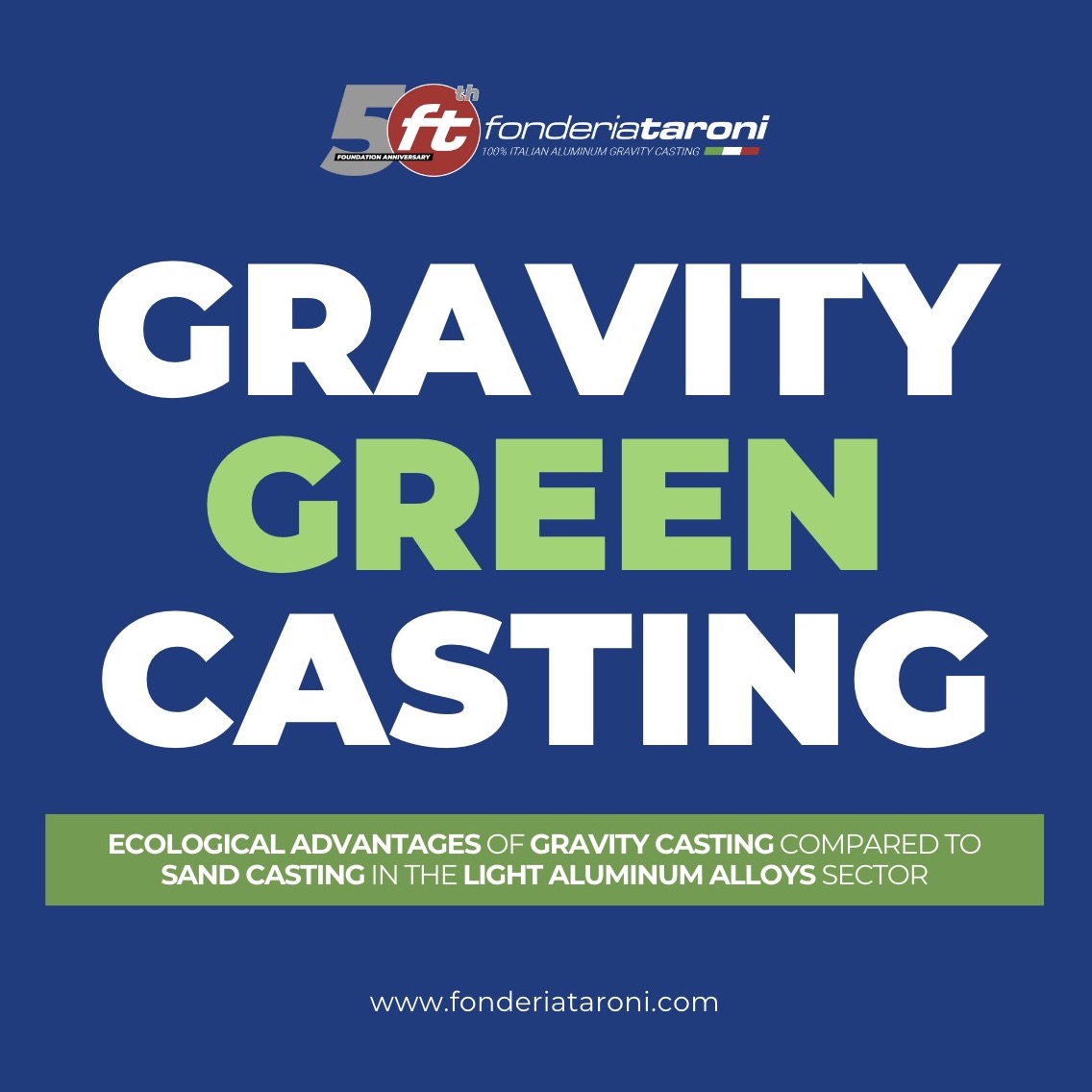
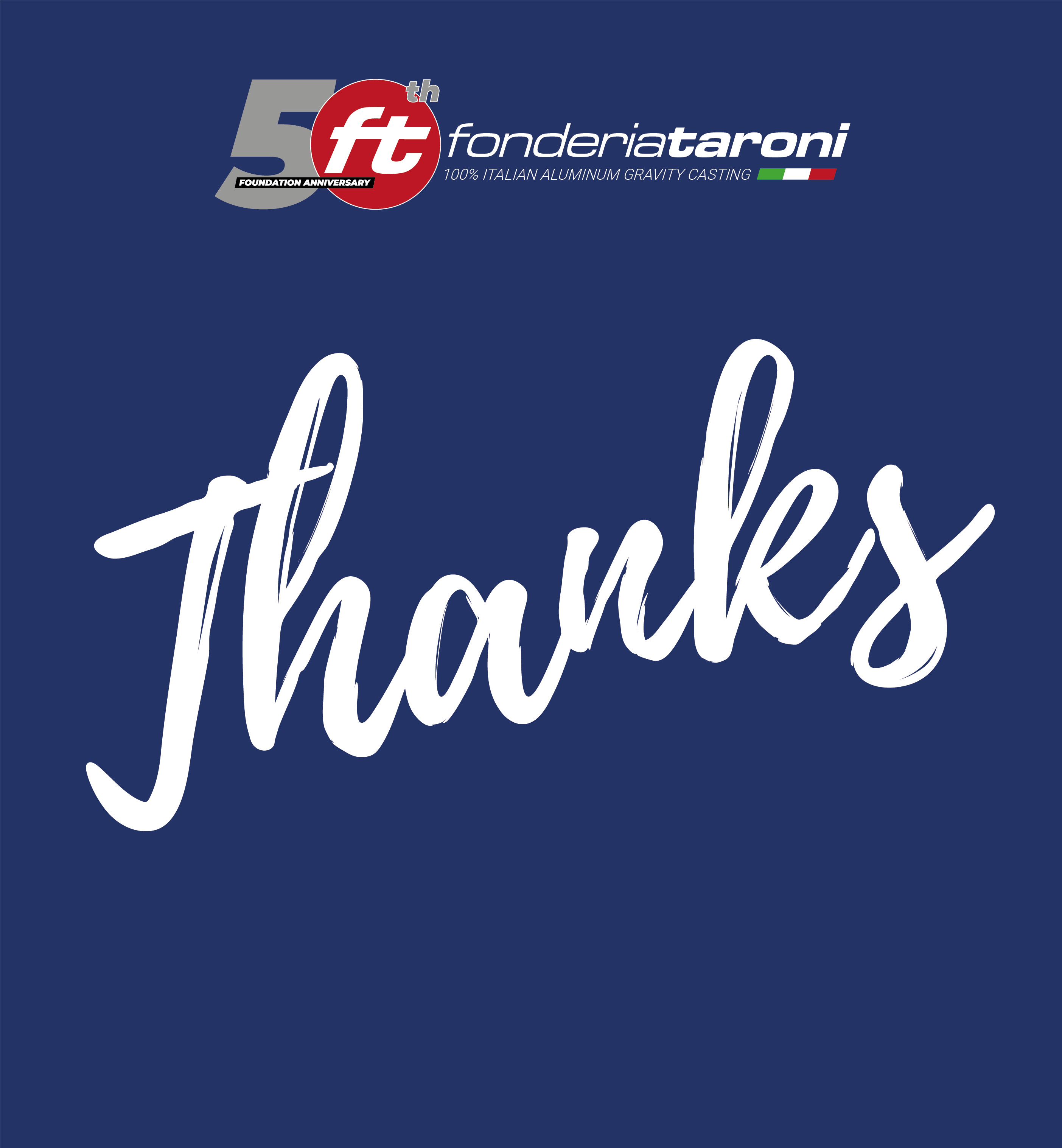
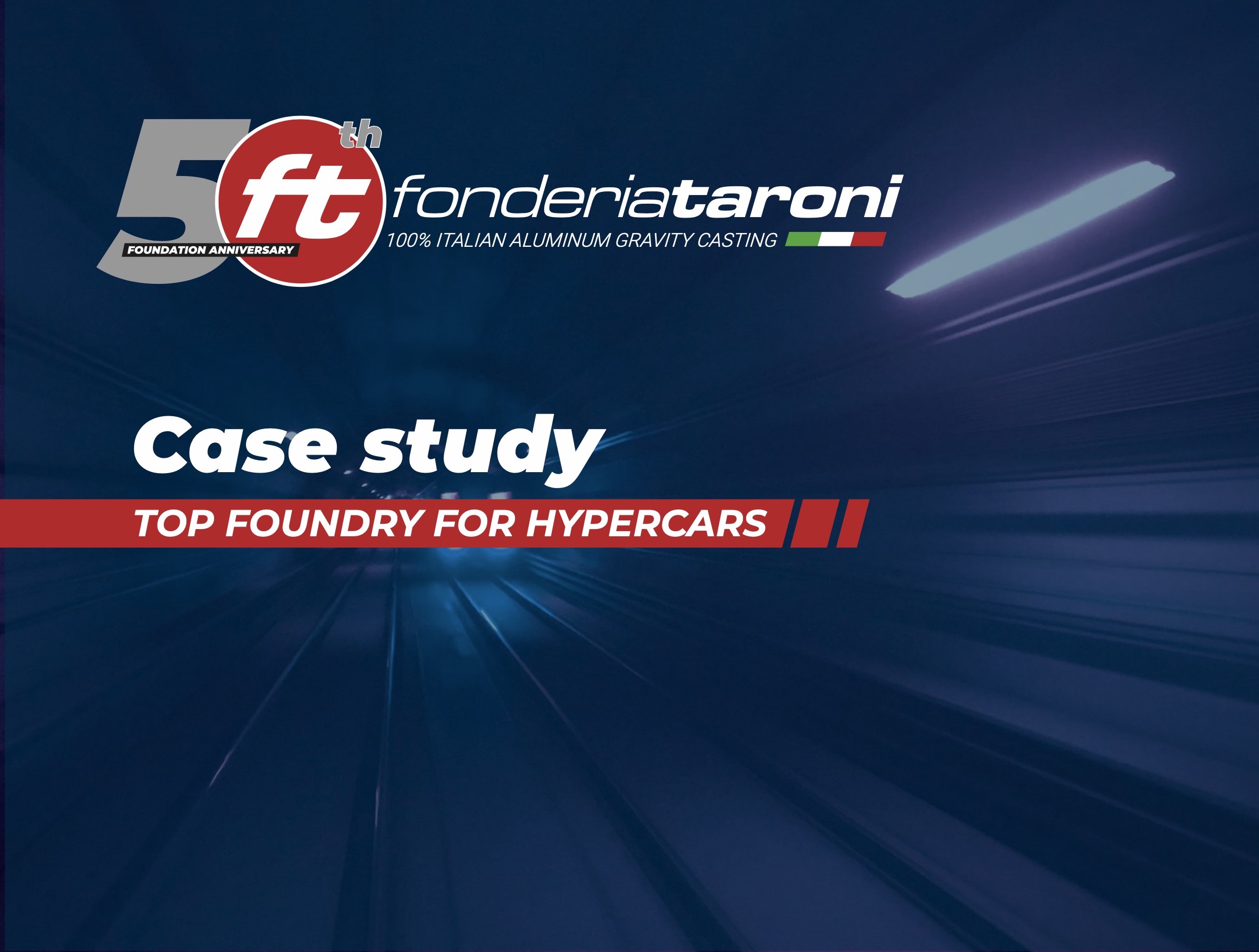
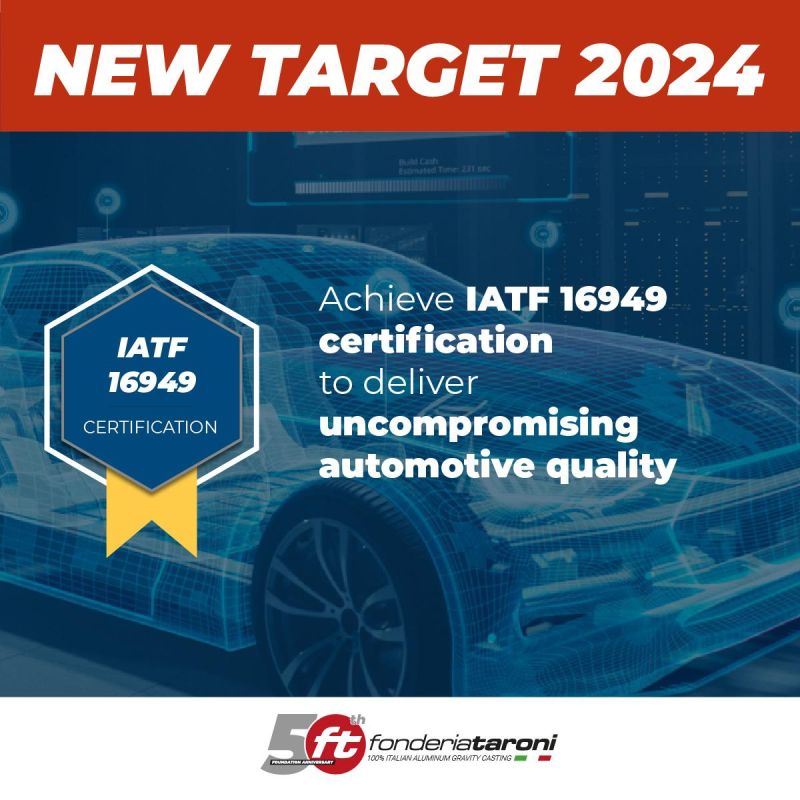














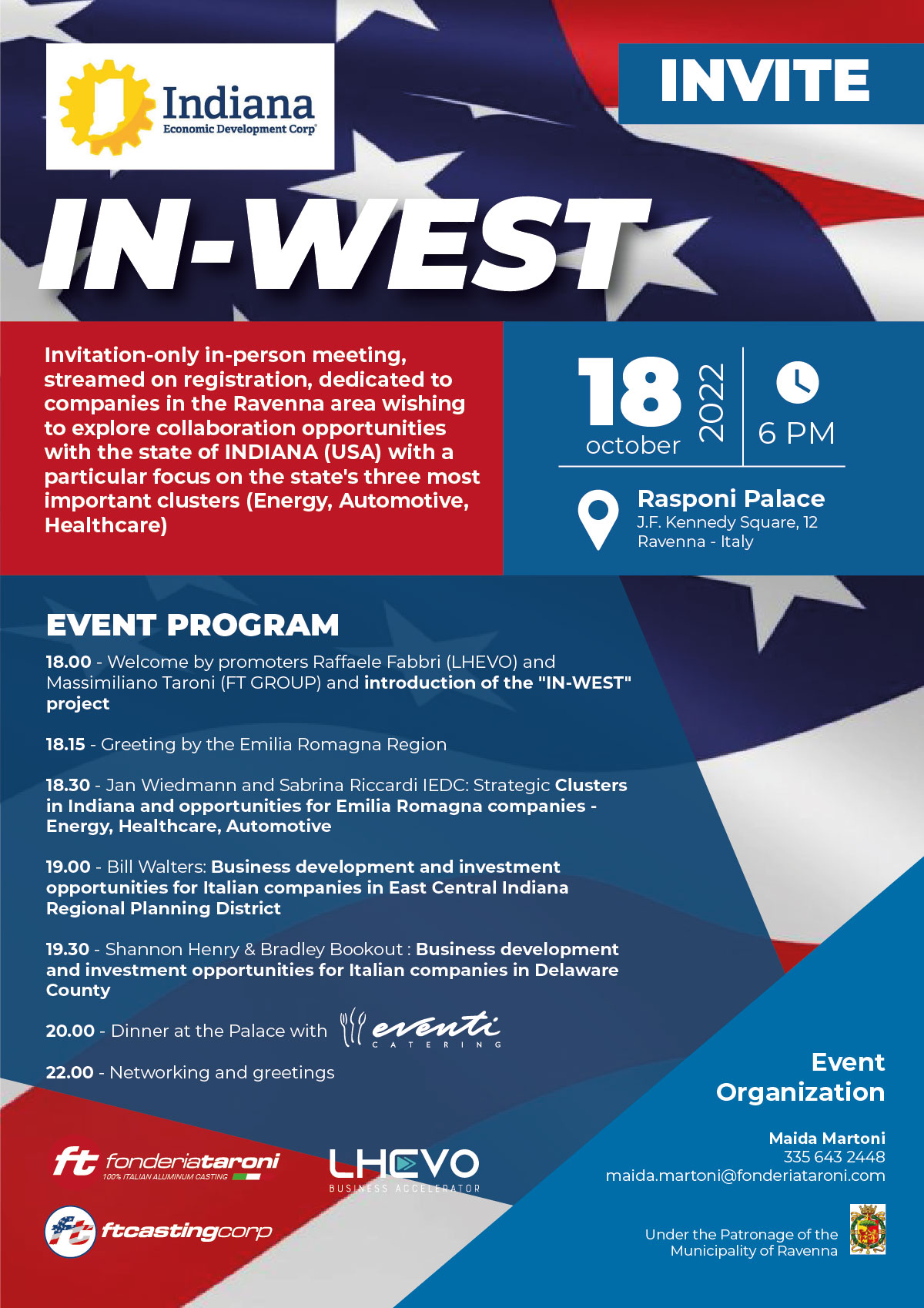
#rapidprotocasting #prototyping #cad3d #print3d #fonderiataroni #foundry #casting #aluminum